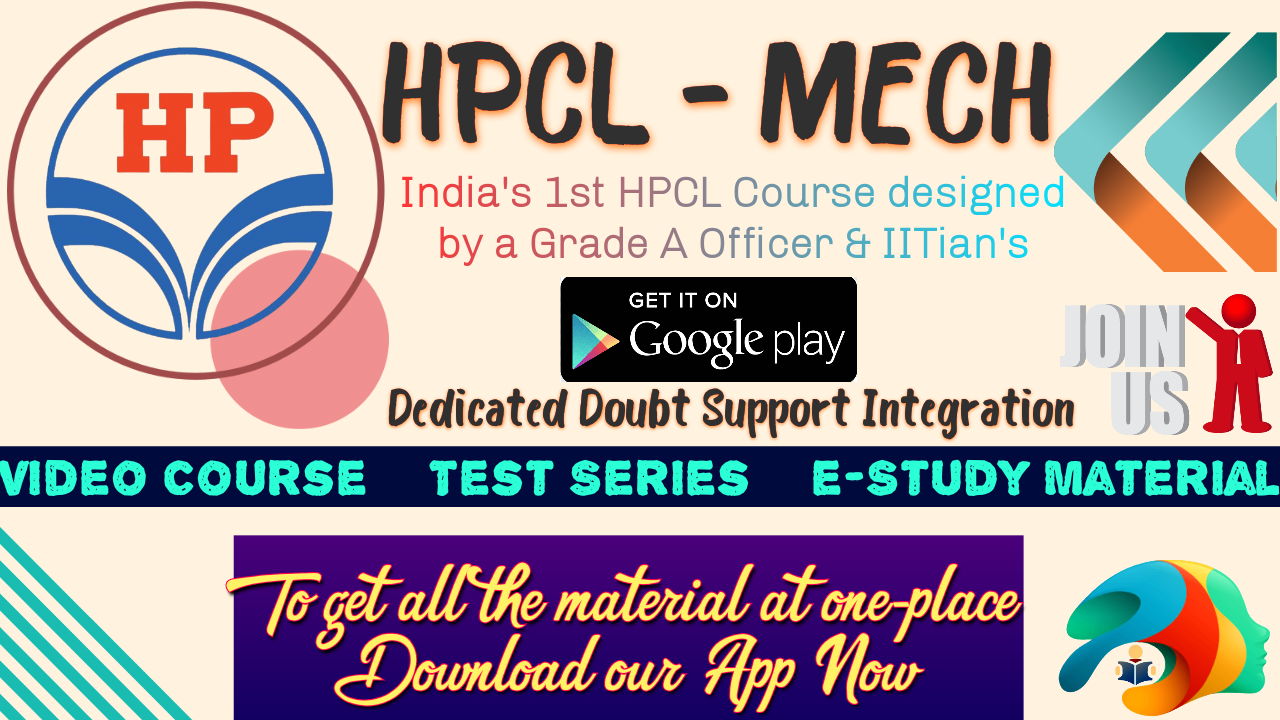| Engineering Mechanics |
- Free body diagrams and equilibrium
- trusses and frames
- virtual work
- kinematics and dynamics of particles and of rigid bodies in plane motion, including impulse and momentum (linear and angular) and energy formulations
- impact.
|
| Engineering Materials |
- Structure and properties of engineering materials and their applications
- heat treatment
- stress-strain diagrams for engineering materials.
|
| Strength of Materials |
- Stress and strain
- stress-strain relationship and elastic constants
- Mohr’s circle for plane stress and plane strain
- thin cylinders
- thick-walled vessels
- shear force and bending moment diagrams
- bending and shear stresses
- deflection of beams
- torsion of circular members
- columns and struts
- strain energy and impact loading
- thermal stresses
- Rotating Rims & Discs
- Bending of Curved Bars.
|
| Theory of Machines |
- Displacement, velocity, and acceleration analysis of plane mechanisms
- kinematic synthesis of mechanisms
- dynamic analysis of the slider-crank mechanism
- gear trains
- flywheels
- static and dynamic force analysis
- balancing of rotating components
- governors.
|
| Theory of Machines |
- Thermodynamic system and processes
- Zeroth, First and Second laws of thermodynamics
- Carnot cycle. irreversibility and availability; behaviour of pure substances, ideal and real gases
- calculation of work and heat in ideal and real processes
- Rankine and Brayton cycles with modifications, analysis of thermodynamic cycles related to energy conversion
- vapour refrigeration cycle, heat pumps, gas refrigeration, Reverse Brayton cycle
- moist air: psychrometric chart, basic psychrometric processes.
|
| Energy Conversion |
- Fuels and combustion
- high-pressure steam boilers
- flow through nozzles
- Gas turbines with intercooling, reheat and regenerators, Steam turbines, velocity diagram, power output and efficiency, maximum blade efficiency of single-stage impulse turbine, blade friction, compounding of impulse turbine
- reaction turbine, degree of reaction, velocity diagram, power output, efficiency
- losses in steam turbines, stage efficiency, overall efficiency and reheat factor
- governing of steam turbines, steam condensers, condenser vacuum, sources of air leakage & its disadvantages
|
| Heat-Transfer: |
- Modes of heat transfer
- one dimensional heat conduction, resistance concept, electrical analogy, unsteady heat conduction, fins
- dimensionless parameters in free and forced convective heat transfer, various correlations for heat transfer in flow over flat plates and through pipes
- thermal boundary layer
- effect of turbulence
- radiative heat transfer, black and grey surfaces, shape factors, network analysis; heat exchanger performance, LMTD and NTU methods.
|
| Fluid Mechanics |
- Fluid properties
- fluid statics, manometry, buoyancy
- control-volume analysis of mass, momentum and energy;
- fluid acceleration
- differential equations of continuity and momentum
- Bernoulli’s equation
- the viscous flow of incompressible fluids
- boundary layer
- elementary turbulent flow
- flow through pipes, head losses in pipes bends etc.
|
| Vibrations |
- Free and forced vibration of single degree of freedom systems
- effect of damping
- harmonically excited and transient vibrations
- introduction to multi-degree freedom systems
- vibration isolation
- resonance, critical speeds of shafts.
|
| Design |
- Design for static and dynamic loading; failure theories
- fatigue strength and the S-N diagram
- principles of the design of machine elements such as bolted, riveted and welded joints, shafts, spur gears, rolling and sliding contact bearings, keys, couplings, brakes and clutches
- Selection of Materials.
|
| Fluid Machines |
- Pelton, Francis, propeller and Kaplan turbines
- performance characteristics and governing of hydraulic turbines
- introduction to Deriaz and Bulb turbines
- selection of turbines
- Centrifugal & axial pumps and fans, reciprocating pumps
|
| Joining: |
- Chemistry of welding, design of welding joints, pre-and post-heat treatment of welded joints
- brazing and soldering
- adhesive bonding
|
| Machining and Machine Tool Operations |
- Mechanics of metal cutting and chip formation, single and multi-point cutting tools, tool
geometry and materials, tool life and wear
- principles of non-conventional machining processes
- principles of work clamping, principles of design of jigs and fixtures.
|
| Metrology and Inspection |
- Limits, fits and tolerances
- linear and angular measurements
- comparators
- gauge design
- interferometry
- form and finish measurement
- alignment and testing methods
- tolerance analysis in manufacturing and assembly.
|
| Computer Integrated Manufacturing |
- Basic concepts of CAD/CAM and their integration tools
|
| Production Planning and Control |
- Forecasting models, aggregate production planning, scheduling, materials requirement planning
|
| Inventory Control |
- Deterministic and probabilistic models; safety stock inventory control systems, economic order quantity.
|






